Companies House strategy 2020 to 2025
Published 29 September 2020
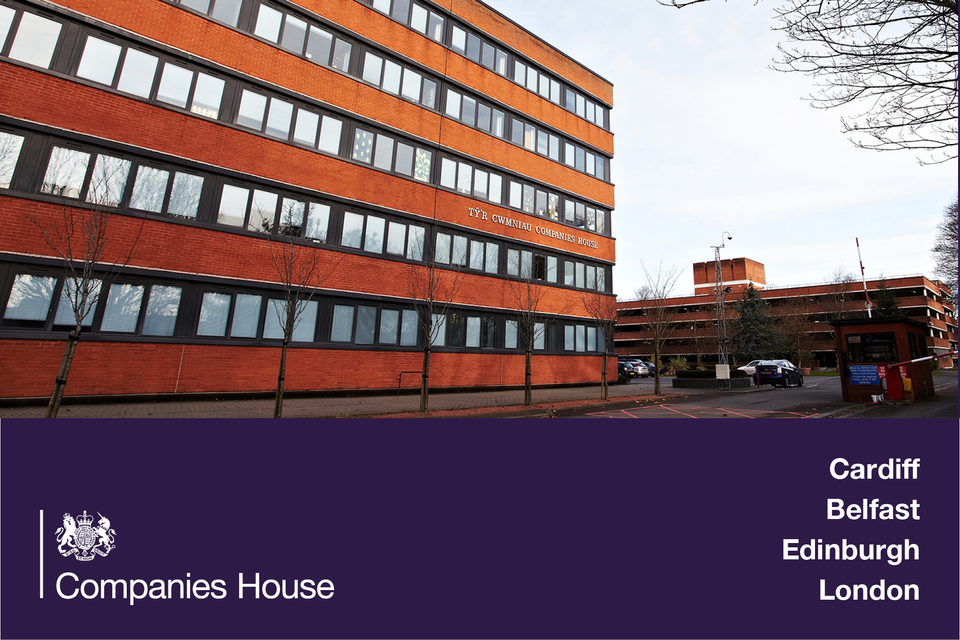
Image of Companies House head office.
1. Introduction
Companies House is critical to the economy: Our core functions underpin entrepreneurship and business growth in the UK and our reliable registers underpin confidence in business.
We have the ability to play a leading role in the fight against corrupt business practices by providing the transparency and clarity necessary for the UK to continue to be regarded as a world-leading place to do business.
This strategy sets out our plans for transformation, which will enable us to maximise the value we add.
Our services help people doing business to fulfil their obligations in exchange for limited liability status, supplying data which we then make widely and freely available.
Our data is used to support millions of business decisions and gives us the potential to play a leading role in the fight against economic crime. The transparency of our data contributes to the UK being regarded as a world-leading place to do business.
Since we put our previous strategic plan in place 3 years ago, our external environment and the challenges we face have changed significantly. Our new purpose, vision and strategic goals are our response to the challenges of our new environment.
Where we’ve come from and where we’re going
In the past, as the home of company information, we have made substantial contributions to making the UK a great place to do business:
We were leaders in establishing digital services for both submitting and searching company information. High take up of digital services has realised efficiencies for both us and users, and providing free data triggered a huge increase in its use for multiple purposes.
Our early digital services were established over 20 years ago and have been improved and augmented many times, including to reflect a number of major changes in legislation. In the last few years we have implemented a step change in corporate transparency by adding data for people with significant control (PSCs) to our registers and at the same time have continued to drive improvements to the quality of all our data. Our services are highly available and reliable, and our people well equipped to support them. However, our internal systems and digital infrastructure are still those we put in place many years ago. We will therefore be investing substantially in updating not just the services that are visible to our customers, but also the internal systems and infrastructure that support them.
We contribute to making the UK the best place in the world to start and grow a business. In this, it is not enough to only improve our own services, and we will therefore seek to work with others in government to improve our services to businesses and our international standing.
We are now on the threshold of major change, recognising that there is much more that we can do to respond to the expectations of our stakeholders and our own aspirations. We do not underestimate the scale of the challenge that faces us in transforming what we do and how we do it to provide world class brilliant services and take our place in the fight against economic crime. We do believe that we are fit for the challenge, and have reflected it in our purpose.
2. Our purpose
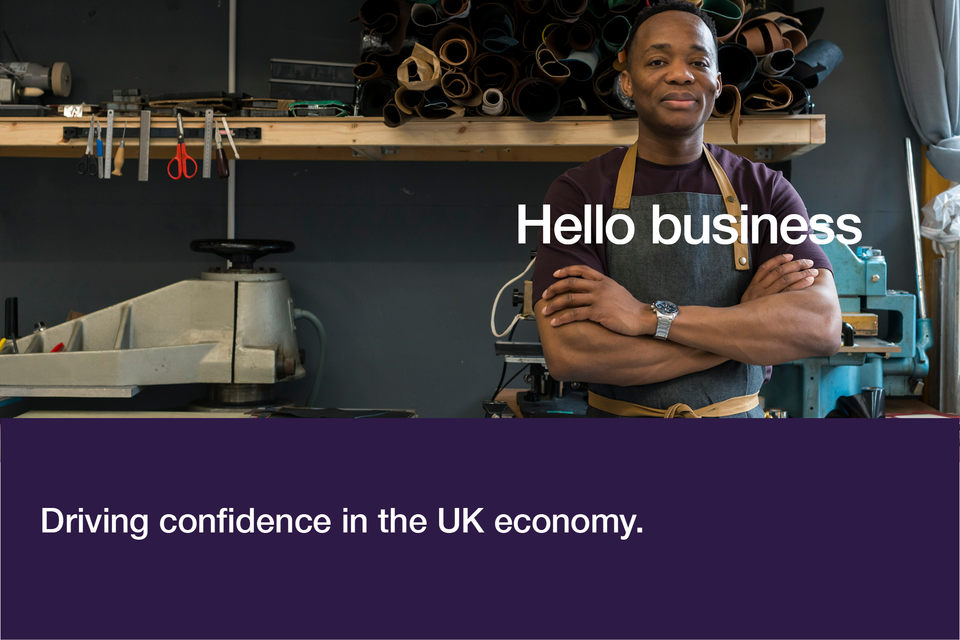
Hello business - driving confidence in the UK economy.
Our purpose reflects the world in which we operate and the contribution we can make to driving confidence in the UK economy and UK business.
A key element of the UK’s business environment is a high standard of corporate governance relating to those entities that enjoy the benefits of limited liability. These benefits are conferred in exchange for standards of transparency and accountability which are essential to give confidence to business, investors, society, consumers and the economy as a whole.
Companies House is uniquely positioned to enable, encourage and where necessary enforce compliance with transparency obligations. Our work, and the legal frameworks on which it is based, are well regarded internationally. We have already made ground-breaking contributions to corporate transparency by providing free data and the early establishment of a register of people with significant control (beneficial owners). Our services are used every year to submit millions of items of information and to carry out billions of searches for data. Take-up of our digital services and customer satisfaction in them are high and continue to rise. Where this is not enough to encourage compliance or discourage misuse of our registers, we act within the remit of our existing powers.
Whilst we have achieved a lot in the past, giving us a firm foundation to build upon, there is further to go. Our purpose ‘Driving confidence in the UK economy’ presents us with both opportunities and challenges. In recent years concern has grown that the UK’s corporate framework is open to misuse, and that this can lead to a lack of confidence in some of the data we hold. At the same time, continual advances in technology change expectations of what we can and should deliver.
We need to address these issues and will do so through programmes of legislative reform and organisational transformation. These, working together, will give us the means to fulfil a substantially changed role with a strengthened focus on preventing and tackling economic crime, fulfilling our purpose in new and innovative ways.
There are some more immediate actions we can take, but we will also need legislative change to give us additional powers. We will need new powers to, for example, verify the source of information, cross check that information, and challenge and remove any that is incorrect. Our end goals are to have registers which are more efficient, effective and resilient whilst combatting misuse of corporate entities. We aim to establish a balance between effective regulation and ease of doing business, and between transparency and protection of an individual’s privacy.
At the same time as we seek a way ahead on these issues, building on the 2019 public consultation on corporate transparency and register reform and the recent government response, Companies House has embarked on an organisational programme of change. This will transform not just what we do but how we do it - transforming our services, our culture and our ways of working. We do not view transformation and legislative change as separate. We see them as inextricably linked, providing together the things that will enable us to fulfil our purpose and realise our vision.
This strategy lays out the strategic goals we are working towards to build both services and organisational capability. It outlines the broad activities that will enable us to bridge the gap between our current position and achievement of those goals.
Delivering the level of change needed is a challenging but exciting prospect. The next 5 years will see the fulfilment of the government’s vision of a new role for Companies House in the economy and in the fight against economic crime. We will ensure that legislative changes are translated into new systems and processes that work for our customers, as well as effectively delivering that vision. We will redevelop and augment our digital services to become more intelligent and intuitive as we look towards becoming a fully digital organisation. To support this, we will transform our existing infrastructure to provide more modern, responsive and connected systems. We will also transform our structure and culture to enable our people to rise to the challenge presented.
In the recent past we have faced unanticipated and unprecedented challenges as we have focused on responding to the coronavirus (COVID-19) pandemic. Our ability to respond swiftly has provided proof of the value of work already underway, from our ability to change services and provide data on companies across government to our ability to ensure the majority of our people could work from home and their embracing that way of working. We will not lose the successes and accelerated progress we have made and will incorporate these into our ways of working as we move forward to the next normal.
More detail about tactical approaches and projects to deliver against specific aspects of those goals will be provided in our 2020 to 2021 and subsequent business plans.
3. Our vision
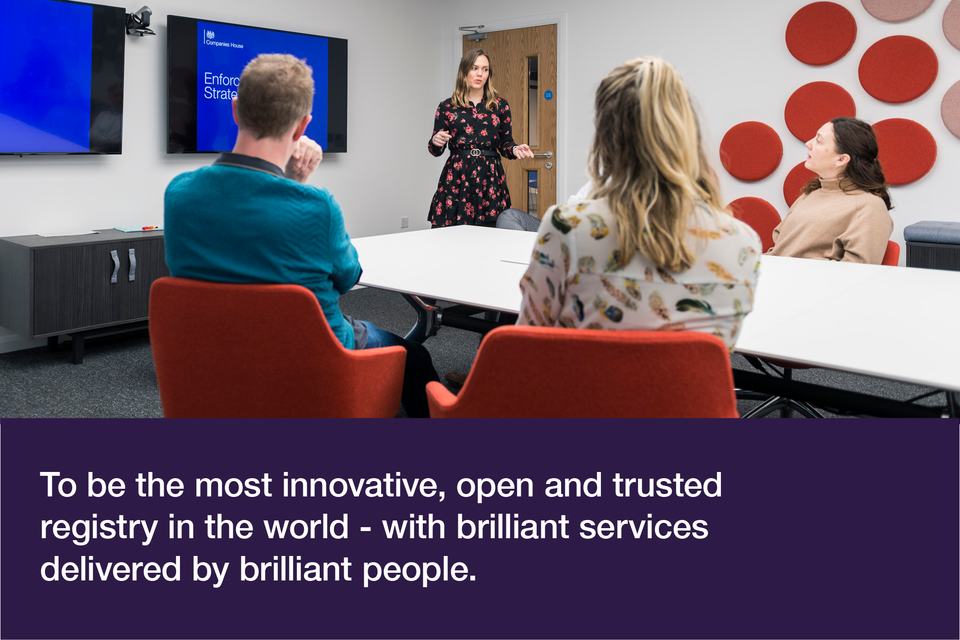
To be the most innovative, open and trusted registry in the world - with brilliant services delivered by brilliant people.
We will achieve our vision through working towards goals grouped under the broad headings of our registers, our services and our people, and underpinned by sound financial, resource and environmental management.
Our goals support our vision by setting out where Companies House will be as an organisation by the end of this 5 year strategy. They are:
- Our registers and data inspire trust and confidence
- We maximise the value of our registers to the UK economy
- We combat economic crime through active use of analysis and intelligence
- Our brilliant services give a great user experience
- Our culture enables our brilliant people to flourish and drives high performance
- We deliver value through efficient use of resources
Being a digital organisation is fundamental to achieving our goals and realising our vision. Our digital services are already vital to us, and in the future they will be key to successful delivery of our transformation. We will review our existing services end-to-end and expand coverage to make digital journeys available for all services. We will seek to maximise digital filing as a vital route to delivering across a range of goals, such as improving the usefulness of data and facilitating reductions in the carbon footprint of reporting and compliance.
4. Our registers
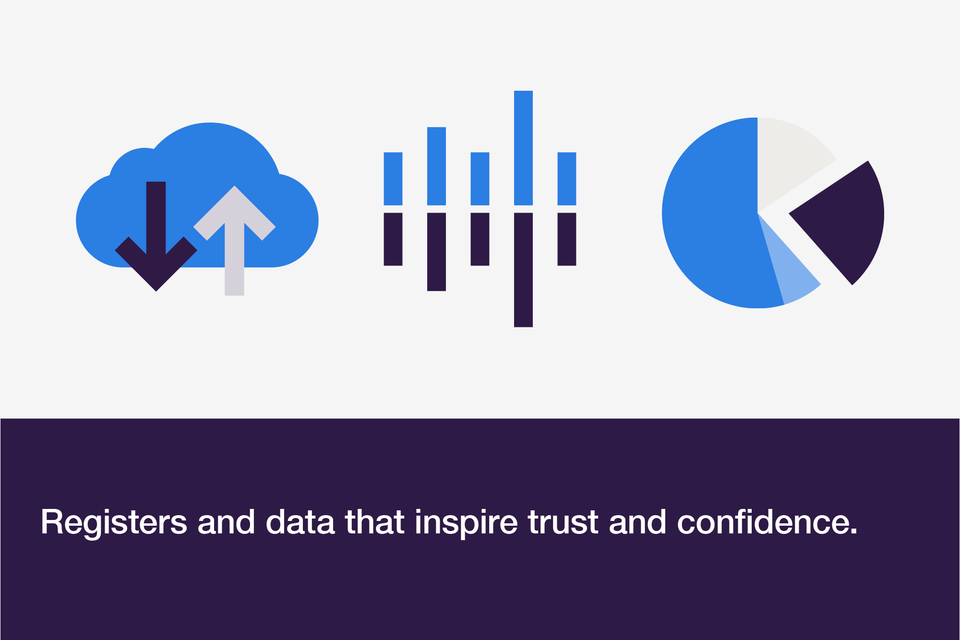
Registers and data that inspire trust and confidence.
Our registers and data are trusted by a wide variety of users including companies, investors, researchers, credit reference agencies, law enforcement and other parts of government. Our data is used on its own and combined with data from other sources to make decisions, carry out investigations and support law enforcement.
In the past few years we have taken a variety of steps to improve the quality of our data. We have located discrepancies between accounts data submitted to Companies House and HMRC, and identified and engaged with companies with no natural person directors. We have also undertaken exercises to improve specific core data items such as nationalities, Standard Industrial Classification (SIC) codes and postcodes.
However, we are aware that there are further improvements we can make in the quality of our data, and that sometimes our data can be open to abuse. Over the next 5 years we will seek to make changes, some requiring legislative backing, which will enhance the quality, reliability and usefulness of our data. In parallel we will deter, and act against, those who persist in misusing our register.
Registers and data that inspire trust and confidence
To deliver on this goal we will:
- ensure that our data is trustworthy and fit for purpose
- correct data where necessary and remove inaccuracies
- check or verify the information that is provided to us where necessary
We’ll know that we’re delivering by measuring:
- data quality, through checking internally and against external sources
- feedback, complaints, and timescales for resolution and correction
- compliance rates
Ensuring that our data is trustworthy and fit for purpose
It is fundamental to fulfilling our purpose that the data on our registers is trustworthy. We want our customers to be clear and confident about what the data is and therefore how it can be used for a wide range of activity.
To inspire confidence, we will strengthen the end to end process for obtaining, handling and checking data, at all stages limiting potential misuse. Rates of compliance for submitting information are in many cases world leading, but we know that there are currently cases of false information being filed. Sometimes this is accidental, stemming from confusion or lack of knowledge on the part of our customers. In this instance we will look to our redeveloped services, improved guidance and other support mechanisms to help users of our services understand what they need to do and to get it right first time at the right time. However, some false filing is deliberate misuse, and here we will seek powers to deter it through upfront checks and, should a false filing succeed, we will enforce penalties.
Correcting data where necessary and removing inaccuracies
Accepting that there may continue to be instances where false information is placed on a register, whether inadvertently or deliberately, we will continue with and strengthen our analysis of register data and the feedback loops which identify and report discrepancies. We will do this through the development of increasingly sophisticated digital solutions including artificial intelligence and machine learning. To better ensure the accuracy and currency of our registers, we will seek powers to make amending inaccurate information easier and to remove information in certain circumstances.
Reporting of inaccuracies is in itself proof of the value of having many eyes on our data and the mechanisms we have introduced for reporting issues. However, our first aim has to be to stop false information being placed on a register in the first place.
Verifying information
We welcome the government’s intention to give the registrar powers to verify information provided to us, including comparing it to third party data sets within and outside government. This cross checking will serve both to verify data and to expose instances of abuse where one set of data has been presented to Companies House but different information to other bodies. Whilst some of the current barriers to our doing this are legal, others are technological. To address this we are already embarking on technical proofs of concept, testing whether solutions we are considering have the potential for real-world application in our services. Development of new technological solutions will allow us to be as proactive as possible whilst we await legislative change. We will also seek the additional powers we need to be able to challenge and remove information which is incorrect.
As well as verifying information we will also seek to verify the identity of those who are setting up, managing and controlling companies, including those providing information. Whilst this is also something which will require changes to legislation, we are again already carrying out exploratory work. This will ensure we can deliver a solution which achieves the optimum balance between the needs of register integrity and burden on our customers. We will also work across government to streamline processes around verification and identity, identifying and implementing synergies for those completing multiple processes.
Maximising the value of our registers to the UK economy
To deliver on this goal we will:
- support transparency by providing open access to data via a variety of digital methods, making it available for others to exploit
- promote the use of register data in government to fully realise its potential
- encourage the use of our data to support business, to build economic confidence and to tackle crime
- extend register data to meet increasing demands and provide increased value
- protect data appropriately whilst also facilitating access for those entitled to it
We’ll know that we’re delivering by measuring:
- use of our data by business, the public, law enforcement and other government departments
- how our services enable timely decision making by users
- results of research and evaluation
- additions and changes to register data
Supporting transparency by providing open access to data
Since 2015, almost all the data we hold has been accessible online, free of charge and without delay. Making data free prompted an exponential increase in its use and this continues to rise.
Register data was accessed via our services over 8.6 billion times in 2019. Free access to data is available through our web service and also via an application programming interface (API), giving consumers and technology providers access to real time updates on companies. A recent report placed the value of our register data to the economy at between 1 and 3 billion pounds a year.
Even with these figures we know that there is more that we can do to facilitate access to data and to help users derive maximum benefit from it. These things fall into 3 main categories: increasing the amount of searchable data, providing different ways to access and process data, and adding to our existing data set.
Having more information provided to us in data format makes it more efficient for us to process and offers more potential to consumers of that data to process it, combine it with other data sets and derive value from it. An example of where we ourselves can improve functionality and accessibility is by giving access to data rather than pdf or image files. In some cases we will be able to do that because we already hold the underlying data.
In other cases, such as accounts data, we also need to increase the information provided to us digitally as data. In 2019, take-up of digital filing for accounts stood at 84%. This means that we are unable to make the content of 16% of the 3.28 million sets of accounts accepted that year available as data.
We will therefore continue to develop our services to be accessible to all and to use the means available to us to encourage users to use digital rather than paper channels. Where we develop new services in the future we will aim for the default to be to develop these solely as digital interactions.
We will continue to support transparency by investigating new and enhanced ways of providing access to our data. For example, further developing our streaming API that gives real time access to data changes.
We will work with users to understand their needs for how data is presented and made available for them to process and analyse.
Promoting the use of register data in government
We know that data held by Companies House is already in use in other areas of government and has been proven to provide substantial benefits. These can include delivering social benefits, reducing operating costs and increasing productivity relative to the use of alternative data sources.
We are convinced that there is further value to be derived and so will continue to promote our data and its use throughout government. Where necessary we will seek ways to make it easier to access and consume so that its value can be fully realised.
We are therefore working with other government departments to understand what data they value and where we might be able to work together to derive maximum value for government and the UK economy.
We have already had evidence of the value our data can provide during the COVID-19 pandemic and have been commended for having swiftly responded to requests for data on companies during this time from both central government and specific departments. We will continue to build on this success in the future and will also seek to identify additional information that might be included to support policy objectives and provide a broader and more valuable data set.
Encouraging use of our data
We are also aware of areas where our customers would like to see us holding more data. This might be to give more detail on a particular aspect of a company, or to broaden the scope of data available. There is potential for us to collect data on behalf of, or jointly with, other areas of government, deriving benefits for users and government by eliminating additional effort. We expect over the life of this strategy to be adding new regimes, for instance for the registration of the beneficial owners of overseas entities holding property in the UK. In these instances entire new data sets will be built and made available.
Protecting data
Although the majority of the information we hold is publicly available in exchange for limited liability, there are various reasons for some to be protected and to not be freely available. We anticipate that in the future we will be collecting more that falls into this category. We will, for example, begin to collect data that provides the means of verifying certain information. In these instances we will store it securely and ensure it is not released to the public. We will however make it available in specified instances and ways to those who are entitled to access, for instance law enforcement agencies.
We have to ensure that all data, whether public or private, is kept secure against tampering. Keeping information secure in the face of changing threats is core to our purpose and we will respond by staying at the forefront in deploying secure and reliable services.
Combatting economic crime through active use of analysis and intelligence
To deliver on this goal we will:
- be proactive in identifying suspicious activity
- carry out analysis that enriches our data to provide intelligence
- collaborate with others to share information to prevent and tackle crime
- respond positively and promptly to information received
We’ll know we’re delivering by measuring:
- referrals to law enforcement
- our active use of our own analysis and intelligence
Economic crime represents a significant threat to the UK. It is frequently serious and organised, and serious and organised crime is estimated to cost the UK at least £37 billion each year. Companies House has a role to play in reducing that cost. The overwhelming majority of UK companies are run for fully legitimate reasons, but in recent years concerns have grown that the UK’s framework is open to misuse.
There is especial concern around corporate entities being used to facilitate economic crime and launder the proceeds of crime. Preventing misuse by stopping false filing and knowing who is behind a company are fundamental aims behind our plans to carry our further verification and checking. However, if this is unsuccessful, we also need to be alert, and act where companies are found to be being misused.
We already enjoy good relationships with a wide range of law enforcement partners at both strategic and tactical levels and provide information to them that underpins their investigation and enforcement activities. The government’s Economic Crime Plan recognises the role Companies House has to play, anticipating advanced intelligence and enforcement functions which we will be developing.
Being proactive in identifying suspicious activity
In the future we look forward to enhancing the exchange of information between us, for instance by being able to be more proactive in identifying suspicious activity. We have started initial work in that area and are investigating the use of machine learning and modelling to facilitate the identification of potential suspicious activity. We expect this work to be completed within the life of this strategy and will, where necessary, seek changes to legislation to allow us to derive full benefit from the tools developed.
Analysis that enriches our data and provides intelligence
We have a vast array of data available to us in Companies House providing in turn a wide range of opportunities for analysis. Enhanced analysis can provide our partners with not just raw data but also with real intelligence derived from our data. This in turn will provide them with the tools they need to combine this data and knowledge with that from other sources to enable them to better tackle crime.
We are already investigating ways to exploit new techniques and technologies to analyse our data. In conjunction with this we are utilising both expertise and data from across government and elsewhere, and upskilling colleagues to enable them to perform advanced analysis and data visualisation.
Collaborating with others to share information to prevent and tackle crime
Identifying suspicious activity and carrying out analysis are vital components of our contribution to the fight against economic crime, but are not an end in themselves. To ensure that maximum value is derived, we have to ensure reliable and timely ways to exchange information and to ensure that what we provide is fit for purpose.
We will start by fully identifying reporting gateways and using them to maximum effect within our current legal framework as well as reviewing our current processes for reporting suspicious activity. Further work to identify gaps in legislation that restrict activity will ensure these are captured as part of future legislative reform, enabling us to collaborate even more closely in future.
Responding positively and promptly to information received
Enhancing our organisational analytical capabilities will allow our people to respond even more positively and promptly to information received. This will be increasingly important in the future as we anticipate increased reporting, for instance as a result of the implementation of the Fifth Money Laundering Directive which obliges certain entities to notify discrepancies between their beneficial ownership records and Companies House data relating to PSCs.
5. Our customers and services
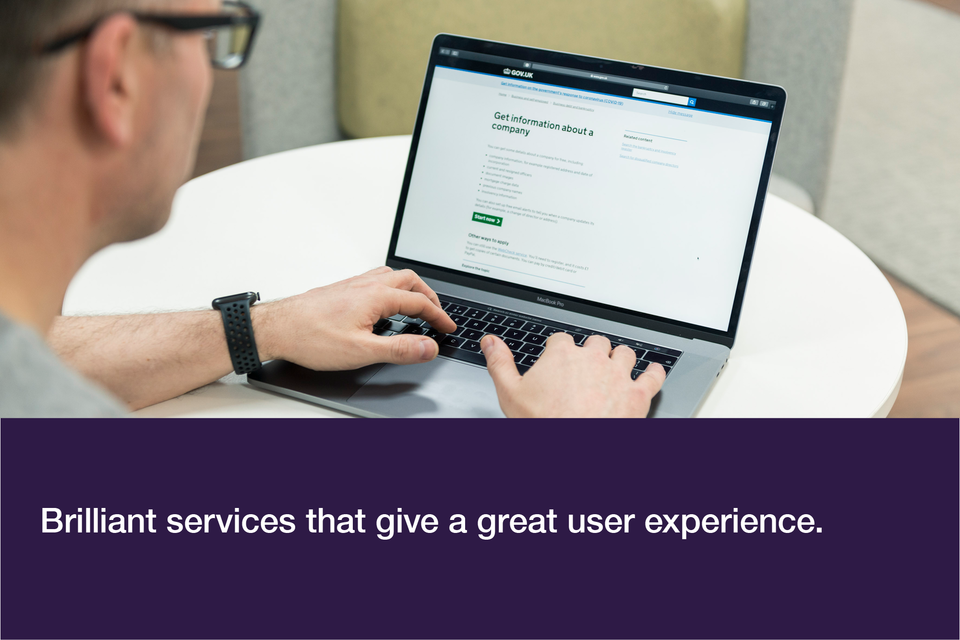
Brilliant services that give a great user experience.
To deliver on this goal we will:
- provide brilliant services to all our users
- work with users to develop services they trust and value
- inform our service development through insight and research
- make our services digital first, accessible, and easy to use
- ensure our services add value and promote effective compliance
We’ll know we’re delivering by measuring:
- customer satisfaction
- customer complaints and our speed of response
- the number and proportion of user transactions that can be undertaken digitally
- take-up of digital services
How we interact with our customers, the professionalism of what we do and how we do it, is crucial. It’s part of how we give confidence in our services and our data and give a great user experience.
Brilliant services
Our services are a major part of that interaction, so we want them to provide a great user experience, enabling all users to succeed first time in doing everything they need to do and to do it online.
Our digital services have served us well, with over 88%[footnote 1] take-up the last business year. However, many that were pioneering services when they were first developed are now ageing. The 5 years of this strategy will see a transformation of our services, replacing our ageing services and supporting infrastructure, and developing new ones.
This will also be reflected in our internal systems. We are embarking on a fundamental transformation programme during which we will rebuild our services so that the same standard of design and performance used for our external users applies also to our internal users. This will facilitate the culture change required and support colleagues in delivering brilliant customer services. Recognising the scale of these changes and the challenge of delivering them at the same time as running business as usual, we will ensure that we focus on maintaining services to customers throughout our transition.
Informing our service developments and working with users
We want to build digital services that are so good that users choose digital in preference to any other channel. If our services are intuitive and intelligent, users will be able to do what they need to do quickly and correctly - making creating and maintaining a compliant company an easy task. Developing new services will ensure we meet our goals of maintaining compliance and creating a digital journey for every interaction. To ensure we place the least burden on business, we will simplify and automate as much as possible whilst ensuring our services need to reflect users’ needs.
We want our services to be seen as best in class, within the UK and internationally. We are alive to how our services are rated and will seek to improve our services and rating in tandem, contributing to the BEIS objectives of making the UK the best place in the world to start and grow a business.
We will meet user needs through continuing to develop all our services through co-operative user research. Our user research labs enable the detailed analysis and assessment of user needs in developing services. We have access to a wealth of information from user research groups and detailed analysis of the current usage of our services. All of this information will be used to drive the development of our services.
Our approach to developing our new services will be to use core components upon which we can deliver the various services we need. Those components may be developed in-house or use available government infrastructure. Where appropriate we will also seek to buy in components rather than develop our own. Our default approach for new services will be to develop digital only solutions and we recognise here that, as for all digital services, we have to ensure standards of accessibility and to provide assisted digital support where needed. Our longer term aim is to move towards digital only services whilst always maintaining those standards and providing the support our users need.
Digital first
Over the period of the strategy we aim to become a fully digital organisation. We believe that digital services are better for both us and our customers: users of our digital filing services typically save time and effort and are more compliant. This translates into less effort and therefore lower costs, and more data on our registers in a timely manner. In both cases there is an environmental advantage from not needing paper or transport.
In addition to further develop our own services, we will continue to collaborate across government to streamline services such as those to set up a business and those involving verification and identity management. Our aim is to identify synergies that will reduce effort and provide clarity for users engaging in providing and accessing data across government.
Our ambition to make it possible for users of our services to do what they need to do online is not just about filing or getting company information, but also about other interactions they have with us: We have already introduced Natural Voice Language (voice recognition) into our contact centre. When the system recognises that the customer is calling about starting or closing a company, if they are using a mobile phone a link to the relevant service is sent to them via SMS. Others are put through to a dedicated line where they hear messages about appropriate online services. In the future we will enhance this service to further facilitate customer needs and support positive, digital, customer behaviours.
Digital services also give us the ability to build in help so that the user is more likely to succeed first time. Where there is a need for additional support we are exploring options such as webchat and chatbots which can help to lead users to the right actions and then help them to complete what they need to do. All our potential uses of new technology will be underpinned by social research, behavioural change and nudge techniques to ensure our approach is effective. We also recognise that there are instances where human interaction is needed. Where this is the case, we have teams of people trained to deal with a wide range of customer issues and handle them sensitively.
6. Our people and the way we work
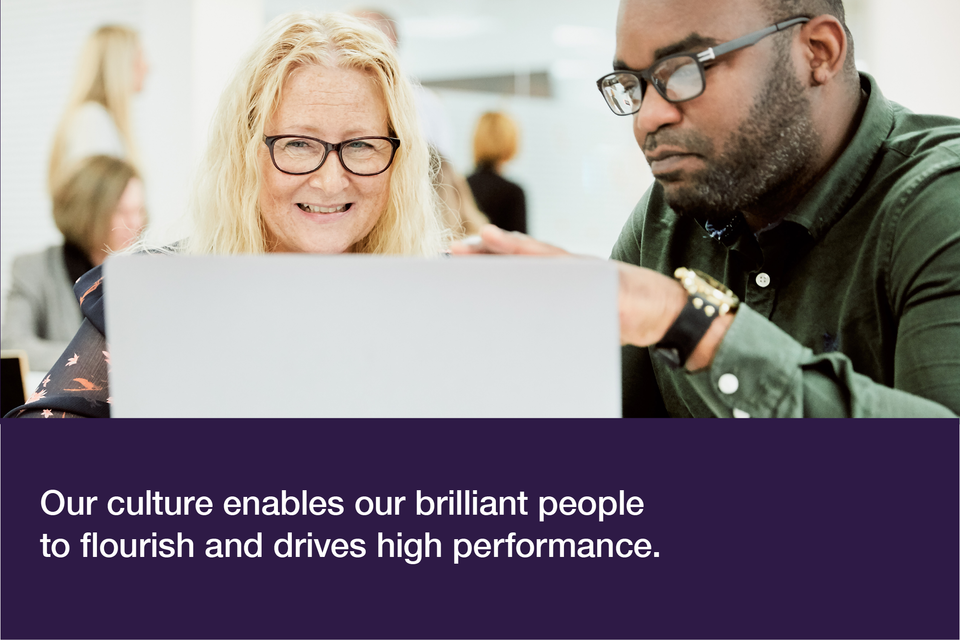
Our culture enables our brilliant people to flourish and drives high performance.
To deliver on this goal we will:
- have the right people in place at the right time, with the right skills to fulfil our role
- embed a mindset of adaptable, bold and curious behaviours
- implement an organisational structure that focuses on customers and service delivery
- value, and benefit from, diversity and inclusion
- create an environment that embraces and facilitates change
We’ll know we’re delivering by measuring:
- staff engagement and employee voice
- skills and training needs
- recruitment and retention metrics
- demographics, including diversity information
- external accreditations
- how we drive change and convert ideas to reality
Our people are essential to realising our strategy and transforming Companies House. We have already outlined the changes we anticipate to our registers and to our services. None of these will happen without our people: their roles and our organisational structure will change, skills will be enhanced, all supported by a creative and dynamic working environment.
Right people, right skills, right mindset
To deliver all this change as well as keeping the business running we have to ensure that we have the right people with the right skills in place at the right time. Over the next few years we will put in place more advanced strategic workforce planning. Based on accurate people data, this will align our resourcing, talent management and succession planning activities and offer a more proactive approach to workforce changes. We will anticipate changing needs for people and skills as we transform and gain new powers to progress in areas such as querying information and in combatting economic crime. This will enable us to fully deliver on all aspects of our role and operate effectively and efficiently in government.
However, the right people with the right skills isn’t enough: we will also look to have people with the right mindset for our transformed organisation and for our organisation to have the right culture to deliver that transformation. We are already on the journey to transform our culture and have co-created a vision of our culture change with colleagues, focusing on adaptable, bold and curious behaviours. Now we are building on this, giving everyone an opportunity to shape the changes ahead, and providing the right conditions for people to flourish and to deliver improved performance and user experiences.
We will enhance our internal capabilities by aligning to and adopting excellent behaviours, standards and best practice for government professions. This includes utilising experience of those professions in other parts of government to help build our performance.
Skills audits and analyses will determine where there are specific skills gaps and what we need to do to address them alongside developing professions. We will at the beginning of the 5 years launch a range of leadership and development programmes. These will develop leaders at all levels to inspire and deliver the massive changes we are undertaking.
Diversity and inclusion
Inclusion is a golden thread that runs through all Companies House activity, and we will find ways to embed diversity in everything we do. Our ambition is to build an inclusive, positive culture where everyone can bring their whole selves to work, facilitating retention of motivated, high performing colleagues. It is also critical for us as a business that we work to reflect the diversity of our customers through our own diversity. We will continue to learn from good practice in this area, pushing ourselves to achieve our ambition.
We have already made significant progress, introducing a range of diversity networks to support and understand the needs of underrepresented groups. Building on this, we are working on our attraction and recruitment rates for underrepresented groups. Improving these will be a priority for us during coming years so we will use analytics and innovative attraction strategies to attract high quality candidates from diverse backgrounds.
We will also continue to work with DWP to provide work experience and to support the long term unemployed in finding ways to return to work, and to participate in intern schemes.
Our organisational structure
A major change in the first year of our strategy will be moving to a new organisational structure: we have explored the best way for Companies House to be set up and organised and agreed that a service delivery model will work best for us and our customers. This means that we will change from our current functional set up to organise around the 3 main services we provide to customers: a filing service, a service to get company information, and an intelligence and enforcement service.
This new structure will enable us to scale and flex our operations and support functions much faster, giving us increased agility and the ability to creatively respond to change. Each service owner will be empowered to carry out research and development on their service, and will have access to resources to implement changes that best address the needs of their users. At the same time, they will work together and with others to understand organisational level impacts, taking a strategic view that ensures we provide brilliant co-ordinated services.
Embracing and facilitating change
We already know that we need to enhance and professionalise our change management capabilities to ensure that change is landed well and embedded quickly. As part of our culture change activity our staff have identified many ideas for improvement. Part of increasing our change capability will be to drive performance through implementation of these ideas faster and ensuring that colleagues are aware, bought in and engaged with the changes taking place.
At the same time, implementing models for smarter ways of working will support our transformation and has already contributed to our ability to adapt so successfully during the coronavirus (COVID-19) outbreak. We are harnessing technology and designing working environments that facilitate increased collaboration and communication. They also enhance user experience and improve cost-efficiency by driving organisational productivity and stimulating innovation. The opportunities and challenges afforded by new ways of working will influence how we use our physical space and ensure we maintain a focus on sustainability and our carbon footprint.
Corporate Social Responsibility
Our Corporate Social Responsibility activity ensures that Companies House acts on its commitment to being a responsible business. There are 4 main pillars to our activity which combine to form an overarching umbrella across the whole of our business. These are: Procurement and Finance, Community, People and Environment.
Transparency and ethical behaviour are fundamental to all our activities, especially in procurement and finance. This covers not only what happens in Companies House, but also our supply chain. Community activity includes a wide range of volunteering and fundraising, as well as donations to a variety of causes from collections organised by our staff. For our people, Corporate Social Responsibility flows through our diversity networks, the way we work, and initiatives to support staff. Many of these activities also contribute to environmental good practice, which is covered in more detail in section 8: Our environmental activity.
All this activity helps Companies House to be a responsible business, and in future years we will continue to seek out opportunities and to ensure that Corporate Social Responsibility remains a thread that runs through everything we do.
7. Our finances and resources
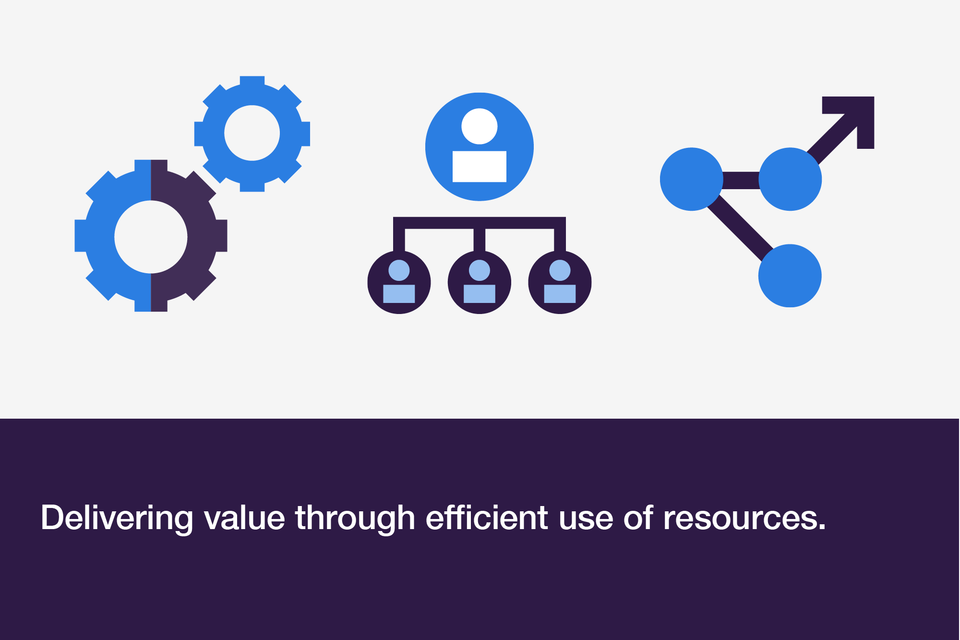
Delivering value through efficient use of resources.
To deliver on this goal we will:
- operate effectively and efficiently as part of central government
- ensure the right resources are available when needed
- ensure value for money and return on investment
- actively collaborate across government and more widely
- manage our costs to deliver value to our customers and government
We’ll know we’re delivering by measuring:
- metrics derived from the Public Value Framework
- value for money
- benefits realisation
Operating in central government
In April 2020 Companies House changed status from a trading fund to being centrally funded by government. It continues operating as an Executive Agency within the Department for Business, Energy and Industrial Strategy. The impact of this change is substantial in relation to how we are funded and the governance around how we make our financial decisions. We will experience much more central scrutiny of our business decisions and our autonomy to manage our finances independently will be removed. This will require Companies House to develop a new operating rhythm to ensure we are able to provide adequate time for the approval processes and to maintain operational agility.
Our changed status also brings new requirements and financial reporting obligations with externally driven deadlines. Consequently, we have had to change how we operate: Good governance, management information and workload planning continue to be vital to us and will help us to operate effectively and efficiently according to our new status.
The vision for our finance and commercial communities is of their being a centre of excellence at the heart of Companies House, driving business performance, agendas and decision making rather than just keeping score. Professionalisation of our finance and commercial communities is a key first step to generating improved organisation-wide financial and commercial acumen.
The right resources, when we need them
A vital part of operating effectively and efficiently will be ensuring that we have the right resources available when needed. Companies House will now be required to secure budgets and funding from central government, and this will require the Finance profession to restructure and support the business to navigate the new ways of working. In the future we will have to learn to operate within ring-fenced budgets after the relative freedom afforded by a trading fund.
As we are entering a period of significant change and uncertainty, we will enhance our strategic business and workforce planning which will assist the production of robust business and financial plans. Our revised governance model supported by our new organisation structure and status will aid us in determining the right investments to make in our portfolio of change activity, choosing those activities that best deliver against our strategic goals and planning for the right resources to deliver them.
Ensuring value for money and return on investment
Delivering value for money for our customers has always been important for us, as is having the right financial resources to achieve the outcomes we want. In future evidencing that we’re using money and resources for the best possible outcomes will be vital in securing future finance.
In view of the level of change we expect, we will also undertake a fundamental review of our fees regime. We need to determine whether the mechanism for setting fees and the level at which we set them remains valid in our new, more digital and automated organisation where we are performing new functions such as more checking and verification. We will also assess ways in which our future fees can be used to drive customer behaviour towards more digital and environmentally friendly practices.
Actively collaborate across government and more widely
However, focus on internal investment and benefits is not enough. We will track the benefits and value that we deliver more widely to our customers, the UK economy and the rest of government. Indeed, we see working with wider government and other partners as a route to delivering additional benefits both internally and externally and will continue to look for opportunities for active collaboration.
We will also continue to seek opportunities to collaboratively deliver solutions to UK businesses with other government departments and find innovative ways to provide and fund new activities.
Managing our costs to deliver value to our customers and government
Whilst we anticipate deriving significant benefits from our transformation, through automation and modernising our digital delivery, we also anticipate significant investment and changes to our running costs as a result of our reform. To proactively manage the transition to this new costing model we must develop the reporting and understanding of our expenditure on both business as usual and change activity, measuring value for money and return on investment.
To aid us in doing this more effectively we intend to embed the principles of the Public Value Framework throughout the organisation. We will assess our maturity against the framework early on and ensure that we improve planning, performance and the process through which we turn inputs to outcomes that maximise value.
8. Our environmental activity
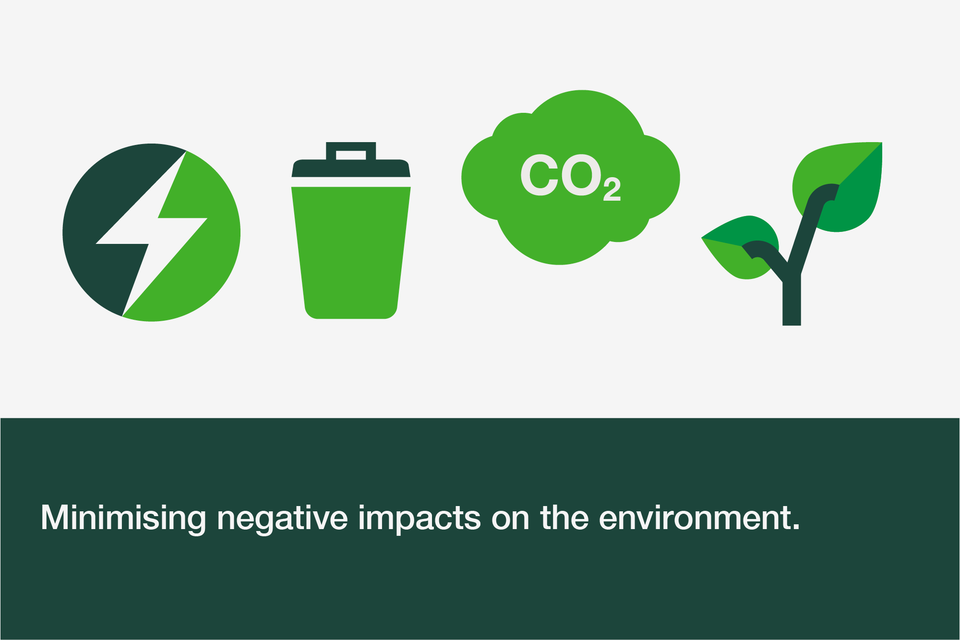
Minimising negative impacts on the environment.
As an organisation with a strong sense of corporate social responsibility we are determined to minimise negative impacts on the environment resulting from not only our activities but also those we require of our customers. Responding to complex environmental challenges, we aim during the period of this strategy to introduce processes that will significantly improve our own environmental performance and services that will help customers to reduce the environmental impact of transacting with us. We are actively seeking environmental standards against which we can measure our success in these areas.
We do not think about the environment in isolation, but rather as an integral consideration in everything we do: how we run our business and seek to deliver on our goals, and how we and our customers interact.
We have already made considerable progress in minimising environmental impact. We have worked towards the goals set out in Greening the Government Commitments to reduce carbon emissions, water use, waste, and supply chain impacts. The installation of a biomass boiler has delivered major environmental and cost benefits by greatly reducing reliance on gas. We have also exceeded expectations in phasing out consumer single-use plastics across our estate, eliminating over 150,000 items in 2018 to 2019. We are keen to do as much as possible to continue this in the future and will continue working to identify ways in which we can reduce environmental impacts not only from our own operations but also by giving customers environmentally friendly options for fulfilling their statutory obligations.
Environmental considerations for customer services
Our services can help our customers to reduce their environmental impact. Digital services mean less paper and a reduction in environmental costs of transportation and storage, accruing environmental benefits for both our customers and us. Although take-up of our digital filing services is high, there is still a big prize to be gained from achieving higher take-up. We will therefore continue to work with users of services to build digital services that are the channel of choice, and to understand how we can encourage and incentivise their use, especially with those high volume users who are yet to adopt digital reporting. In future, when developing services to enables users to fulfil any new filing requirement, we will expect to provide digital routes only, with no standard paper option.
Over the first year of the strategy we will start to further reduce paper consumption and transport impact by phasing out our paper reminder service for accounts and confirmation statement filing. Customers will still be able to benefit from reminders by opting into our digital reminders service. In future years we will build on this to examine other ways in which we can eliminate outward bound paper services and introduce further ways of instead providing notifications through digital channels.
We have recently introduced a service to enable mandatory annual reporting and disclosure of energy and carbon information through company accounts (Streamlined Energy and Carbon Reporting). This will give increased transparency for potential investors and others whilst also raising awareness of energy efficiency with companies’ own decision makers.
Net zero and other environmental targets
The UK’s 2050 net zero target - one of the most ambitious in the world - means any emissions by Companies House would be balanced by schemes to offset an equivalent amount of greenhouse gases from the atmosphere, such as planting trees or using technology like carbon capture and storage. To meet this target, we will in the first instance focus on ways in which we can reduce the environmental footprint of our and our users’ activities before looking to offset what is left.
Every year we have specific environment targets and we monitor and measure our environmental performance in areas such as reducing greenhouse gases associated with our operations, the amount of waste produced, and water consumed. We also have targets related to maintaining and enhancing biodiversity on site and to sustainable procurement where we aim to achieve the best overall value for money for society through buying more sustainable products and services.
Our working environment
We will continue to look at how we can change our working environment in ways that benefit both our people and the environment. Examples for the future are aiding staff wellbeing through the introduction of a new sensory garden and considering introducing a living wall on parts of the building.
Building on past investigations we will carry out a further review to ensure that we keep up to date with the costs and opportunities aligned to electric charging points and solar panels, and will continue to pursue other ways of meeting our environmental targets.
The impact of how we work on the environment
We want everyone to understand the potential impacts that our operations can have on the environment, including biodiversity. We will achieve this by embedding environmental considerations and biodiversity into our business planning processes to ensure they are considered in the way Companies House operates, delivers services and makes decisions.
Smarter ways of working will give us more flexibility in how and where people work, reducing our physical footprint in our offices with commensurate environmental savings as well as the savings to be accrued by less staff travel through working from home or other locations. The devices that support this way of working consume less energy than desktop PCs. Smarter ways of working also gives us a range of communications methods which cut the need for travel to face to face meetings, reducing both carbon footprint and costs.
Changes to our IT infrastructure and moving services to cloud will, over the period of the strategy, mean that our services are run from data centres that can reap the environmental benefits of running at scale rather than maintaining our own server farms.
Environmental considerations for supply change management
Where we need to procure supplies, services and works to operate our business, we aim to achieve sustainable commercial solutions that meet or exceed our business and stakeholder requirements and align to central government policy.
We ensure that we secure value for money and maximise value by effective management of our supply chain. We also ensure through our procurement contracts that our supply chain remains compliant with relevant legislation, including health, safety, quality and environmental requirements. In the future, a robust continuous improvement and learning culture will critically assess performance against high standards, including environmental standards.
Corporate Social Responsibility and the environment
Our volunteering programme will continue to provide opportunities for staff to spend time improving the external environment to Companies House as part of our corporate social responsibility. These opportunities include activities such as litter picks in local communities, supporting local charity activities and pond and stream clearing.
Our programme of corporate social responsibility extends beyond volunteering to responsible use of our resources. As part of a recent refurbishment we were able to identify over 290 items to be donated to charities, giving them a useful further life in the local community and saving them from going to landfill. We will continue this approach in the future when opportunities arise.
9. Our future journey
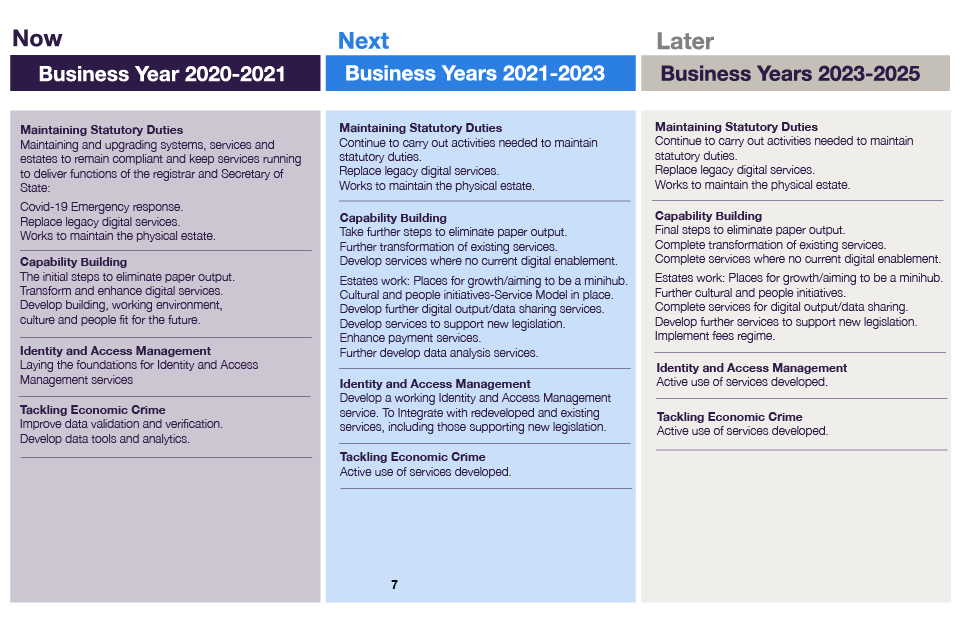
A visual representation of our future journey - Now, Next and Later.
Further detail for year 1 is in the Companies House business plan 2020 to 2021 and we will provide more information on how we will deliver on our strategy in subsequent plans.
Now: Business year 2020 to 2021
Maintaining statutory duties
Maintaining and upgrading systems, services and estates to remain compliant and keep services running to deliver functions of the registrar and Secretary of State:
- COVID-19 emergency response
- Replace legacy digital services
- Works to maintain the physical estate
Capability building
- The initial steps to eliminate paper output
- Transform and enhance digital services
- Develop building, working environment, culture and people fit for the future
Identity and access management
- Laying the foundations for identity and access management services
Tackling economic crime
- Improve data validation and verification
- Develop data tools and analytics
Next: Business years 2021 to 2023
Maintaining statutory duties
- Continue to carry out activities needed to maintain statutory duties
- Replace legacy digital services
- Works to maintain the physical estate
Capability building
- Take further steps to eliminate paper output
- Further transformation of existing services
- Develop services where no current digital enablement
- Estates work: Places for growth/aiming to be a minihub
- Cultural and people initiatives - service model in place
- Develop further digital output/data sharing services
- Develop services to support new legislation
- Enhance payment services
- Further develop data analysis services
Identity and access management
- Develop a working identity and access management service
- To Integrate with redeveloped and existing services, including those supporting new legislation
Tackling economic crime
Active use of services developed.
Later: Business years 2023 to 2025
Maintaining statutory duties
- Continue to carry out activities needed to maintain statutory duties
- Replace legacy digital services
- Works to maintain the physical estate
Capability building
- Final steps to eliminate paper output
- Complete transformation of existing services
- Complete services where no current digital enablement
- Estates work: Places for growth/aiming to be a minihub
- Further cultural and people initiatives
- Complete services for digital output/data sharing
- Develop further services to support new legislation
- Implement fees regime
Identity and access management
Active use of services developed.
Tackling economic crime
Active use of services developed.
-
This figure is Management Information, and as such is audited and subject to change. ↩
